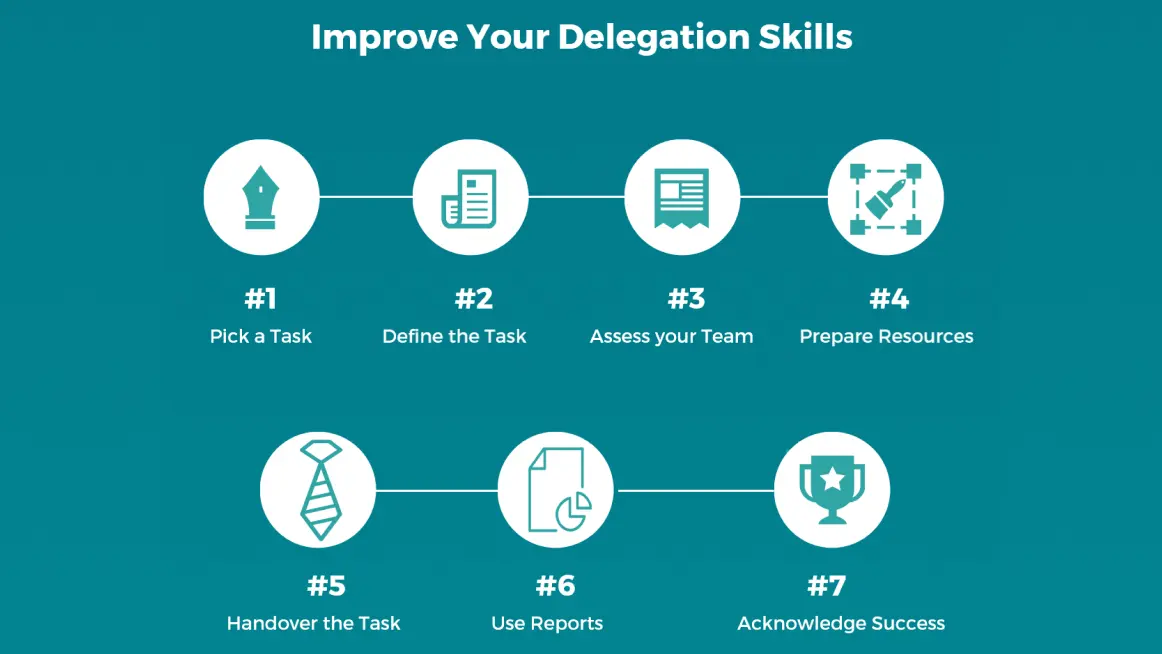Delegation is an effective way to manage a project collaboratively. Delegating signals confidence in your team, which in turn, harnesses their skills and capabilities.
A good project manager leads and empowers the team by trusting them to get the work done.
Benefits of Delegating Project Tasks
Many managers under-delegate because they believe they should handle everything themselves. This mindset leads to overworked managers, frustrated teams, and unsuccessful projects.
Other managers over-delegate and lose touch with the project while their team frantically tries to stay on top of the workload. Delegation offers several benefits to a project manager:
- Free up your own time to manage the project and improve time management skills.
- Use the skills of your team to deliver new ideas and better results.
- Allow your project team members to learn new skills and knowledge for future projects.
- Balance the tasks and responsibilities amongst the team.
Delegation is an important skill that project managers should cultivate. With the right processes and knowledge, you can improve your delegation skills and lead a happy project team! We’ll walk you through seven tips to help you get started.
7 Ways to Improve Your Delegation Skills
Delegating tasks helps you focus on what matters most. It helps you manage your time, trust your team, and get better results. These seven tips will help you improve your delegation skills and keep your team engaged, productive, and confident.
1. Pick a Task that You Can and Should Delegate
While you should take responsibility for hiring a new team member, creating a weekly status report is a task that can be delegated to a team member.
2. Clearly Define the Task
What does the task involve? What is the deadline? Will you delegate full responsibility for decision-making on the task? These are some questions that you should consider before handing over the work.
3. Assess Your Team
Spend some time reviewing the strengths and weaknesses of your team before deciding who is the best fit for the task. This is also a good opportunity for a team member to learn a new skill or take on more responsibility for future projects
4. Prepare Relevant Resources
Provide what’s needed. Briefing documents, meeting minutes, links to a document library, and so on. If your schedule is hectic, you may also want to assign an experienced team member to mentor the selected individual.
5. Hand Over the Work – and Step Back!
Delegating a task also means handing over responsibility for the work. Let them use their skills, manage the task, and own the task. Be patient with their progress, avoid micromanaging, and remain open to new ideas.
6. Establish Clear Reporting Structures
The frequency and format of reports will depend on the project and the task. Implementing a reporting structure keeps communication flowing and also gives your team space to discuss any challenges or issues.
7. Acknowledge the Work
Celebrate the completion of the task. Give credit where it’s due and recognize the effort.
Start Delegating and Lead with Ease
Strong delegation is a key skill of an effective leader. When you delegate tasks clearly and intentionally, you free up time, support your team’s growth, and keep projects on track. It’s not just about handing off work, but about building trust and leading with confidence.
Looking to improve how you manage tasks and projects across your team?
BrightWork offers flexible project management solutions that make it easier to delegate work, communicate clearly, and work better together. Start to lead projects with less stress and more success today.
